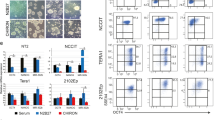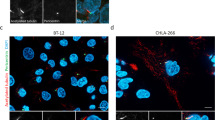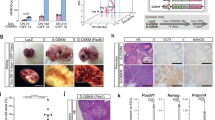Abstract
A subset of male germ cell cancers presenting with advanced stage abundantly express the fibroblast growth factor-4 (FGF4). FGF4 expression is restricted in vitro to undifferentiated embryonal carcinomas (ECs). During induced differentiation, FGF4 expression is repressed in maturation sensitive but not resistant human ECs, suggesting FGF4 plays an important role in malignant growth or differentiation of ECs. To explore these FGF4 signals in male germ cell cancers, the multipotent human EC NTERA-2 clone D1 (NT2/D1) cell line was studied. All-trans-retinoic acid (RA)-treatment of these cells induces a neuronal phenotype and represses tumorigenicity and FGF4 expression. In contrast, RA-treatment of retinoid resistant lines derived from NT2/D1 cells failed to repress FGF4 expression. This implicated FGF4 directly in regulating human EC growth or differentiation. To evaluate further this FGF4 role, FGF4 was constitutively over-expressed in NT2/D1 cells using a CMV-driven expression vector containing the neomycin resistance gene. Three stable transfectants expressing exogenous FGF4 were studied as was a control transfectant only expressing the neomycin resistance gene. RA-treatment repressed endogenous but not exogenous FGF4 expression. RA-treatment of these transfectants induced morphologic and immunophenotypic maturation, changes in RA-regulated genes, and a G1 cell cycle arrest in a manner similar to parental NT2/D1 cells. This indicated FGF4 over-expression did not block RA-mediated differentiation. As expected, RA-treatment repressed tumorigenicity of the control transfectant after subcutaneous injection into athymic mice. Despite RA-treatment, this repressed tumorigenicity was overcome in all the transfectants over-expressing FGF4. The histopathology and neovascularization did not appreciably differ between xenograft tumors derived from FGF4 over-expressing versus control transfectants. FGF4 expression studies were extended to patient-derived germ cell tumors using total cellular RNA Northern analysis and an immunohistochemical assay developed to detect FGF4 protein expression. Germ cell tumors with EC components were significantly more likely to express FGF4 mRNA (P⩽0.0179) than other examined germ cell tumors without EC components. Immunohistochemical results from 43 germ cell tumors demonstrated increased FGF4 expression especially in non-seminomas having EC components. Thus, FGF4 promotes directly malignant growth of cultured ECs, overcomes the anti-tumorigenic actions of RA, and is selectively expressed in specific histopathologic subsets of germ cell tumors. Taken together, these findings indicate how differentiation and anti-tumorigenic retinoic acid signals can be dissociated in germ cell cancer.
This is a preview of subscription content, access via your institution
Access options
Subscribe to this journal
Receive 50 print issues and online access
$259.00 per year
only $5.18 per issue
Buy this article
- Purchase on Springer Link
- Instant access to full article PDF
Prices may be subject to local taxes which are calculated during checkout
Similar content being viewed by others
Author information
Authors and Affiliations
Rights and permissions
About this article
Cite this article
Maerz, W., Baselga, J., Reuter, V. et al. FGF4 dissociates anti-tumorigenic from differentiation signals of retinoic acid in human embryonal carcinomas. Oncogene 17, 761–767 (1998). https://doi.org/10.1038/sj.onc.1201992
Received:
Revised:
Accepted:
Published:
Issue Date:
DOI: https://doi.org/10.1038/sj.onc.1201992



